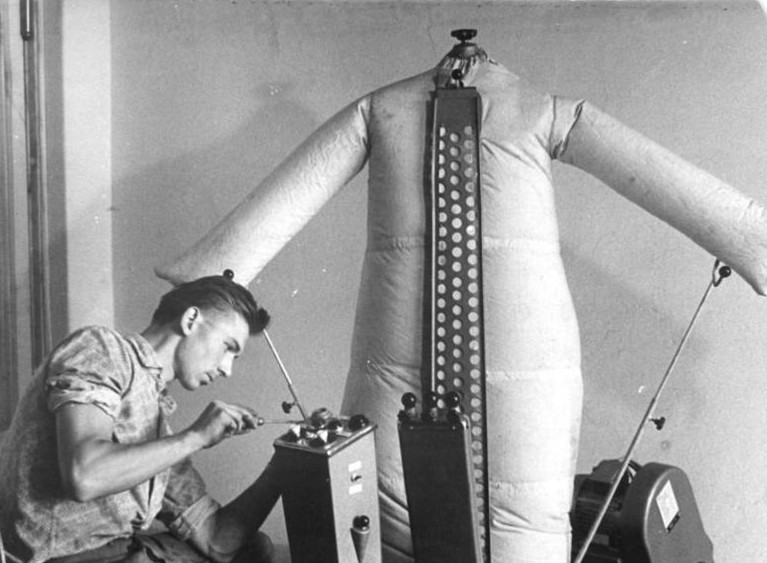While futzing around on Reddit, I came across a link to “Darwin Among the Machines,” a piece from Samuel Butler’s A First Year in Canterbury Settlement, which, amazingly, was written in 1863, when he was beginning to put together Erewhon. An excerpt:
The views of machinery which we are thus feebly indicating will suggest the solution of one of the greatest and most mysterious questions of the day. We refer to the question: What sort of creature man’s next successor in the supremacy of the earth is likely to be. We have often heard this debated; but it appears to us that we are ourselves creating our own successors; we are daily adding to the beauty and delicacy of their physical organisation; we are daily giving them greater power and supplying by all sorts of ingenious contrivances that self-regulating, self-acting power which will be to them what intellect has been to the human race. In the course of ages we shall find ourselves the inferior race. Inferior in power, inferior in that moral quality of self-control, we shall look up to them as the acme of all that the best and wisest man can ever dare to aim at. No evil passions, no jealousy, no avarice, no impure desires will disturb the serene might of those glorious creatures. Sin, shame, and sorrow will have no place among them. Their minds will be in a state of perpetual calm, the contentment of a spirit that knows no wants, is disturbed by no regrets. Ambition will never torture them. Ingratitude will never cause them the uneasiness of a moment. The guilty conscience, the hope deferred, the pains of exile, the insolence of office, and the spurns that patient merit of the unworthy takes—these will be entirely unknown to them. If they want “feeding” (by the use of which very word we betray our recognition of them as living organism) they will be attended by patient slaves whose business and interest it will be to see that they shall want for nothing. If they are out of order they will be promptly attended to by physicians who are thoroughly acquainted with their constitutions; if they die, for even these glorious animals will not be exempt from that necessary and universal consummation, they will immediately enter into a new phase of existence, for what machine dies entirely in every part at one and the same instant?
We take it that when the state of things shall have arrived which we have been above attempting to describe, man will have become to the machine what the horse and the dog are to man. He will continue to exist, nay even to improve, and will be probably better off in his state of domestication under the beneficent rule of the machines than he is in his present wild state. We treat our horses, dogs, cattle, and sheep, on the whole, with great kindness; we give them whatever experience teaches us to be best for them, and there can be no doubt that our use of meat has added to the happiness of the lower animals far more than it has detracted from it; in like manner it is reasonable to suppose that the machines will treat us kindly, for their existence is as dependent upon ours as ours is upon the lower animals. They cannot kill us and eat us as we do sheep; they will not only require our services in the parturition of their young (which branch of their economy will remain always in our hands), but also in feeding them, in setting them right when they are sick, and burying their dead or working up their corpses into new machines. It is obvious that if all the animals in Great Britain save man alone were to die, and if at the same time all intercourse with foreign countries were by some sudden catastrophe to be rendered perfectly impossible, it is obvious that under such circumstances the loss of human life would be something fearful to contemplate—in like manner were mankind to cease, the machines would be as badly off or even worse. The fact is that our interests are inseparable from theirs, and theirs from ours. Each race is dependent upon the other for innumerable benefits, and, until the reproductive organs of the machines have been developed in a manner which we are hardly yet able to conceive, they are entirely dependent upon man for even the continuance of their species. It is true that these organs may be ultimately developed, inasmuch as man’s interest lies in that direction; there is nothing which our infatuated race would desire more than to see a fertile union between two steam engines; it is true that machinery is even at this present time employed in begetting machinery, in becoming the parent of machines often after its own kind, but the days of flirtation, courtship, and matrimony appear to be very remote, and indeed can hardly be realised by our feeble and imperfect imagination.
Day by day, however, the machines are gaining ground upon us; day by day we are becoming more subservient to them; more men are daily bound down as slaves to tend them, more men are daily devoting the energies of their whole lives to the development of mechanical life. The upshot is simply a question of time, but that the time will come when the machines will hold the real supremacy over the world and its inhabitants is what no person of a truly philosophic mind can for a moment question.•
Tags: Samuel Butler

